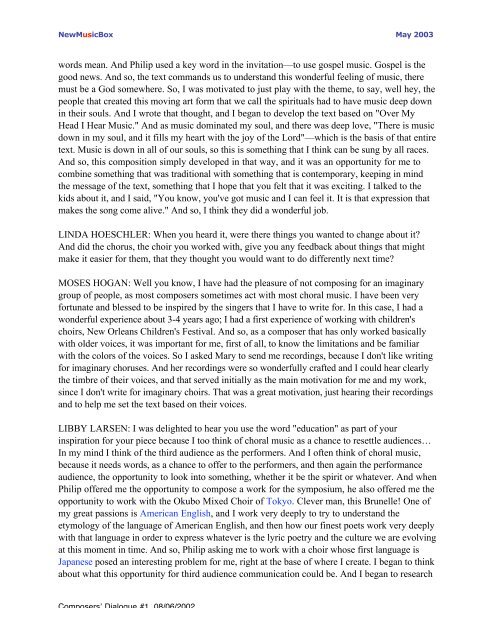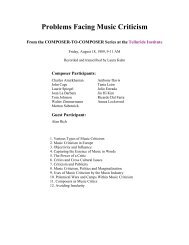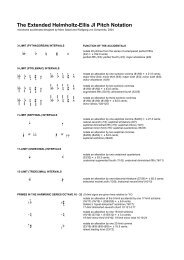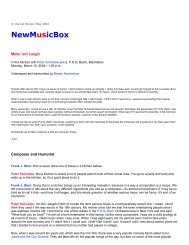Sixth World Symposium on Choral Music ... - NewMusicBox
Sixth World Symposium on Choral Music ... - NewMusicBox
Sixth World Symposium on Choral Music ... - NewMusicBox
Create successful ePaper yourself
Turn your PDF publications into a flip-book with our unique Google optimized e-Paper software.
New<strong>Music</strong>Box May 2003<br />
words mean. And Philip used a key word in the invitati<strong>on</strong>—to use gospel music. Gospel is the<br />
good news. And so, the text commands us to understand this w<strong>on</strong>derful feeling of music, there<br />
must be a God somewhere. So, I was motivated to just play with the theme, to say, well hey, the<br />
people that created this moving art form that we call the spirituals had to have music deep down<br />
in their souls. And I wrote that thought, and I began to develop the text based <strong>on</strong> "Over My<br />
Head I Hear <strong>Music</strong>." And as music dominated my soul, and there was deep love, "There is music<br />
down in my soul, and it fills my heart with the joy of the Lord"—which is the basis of that entire<br />
text. <strong>Music</strong> is down in all of our souls, so this is something that I think can be sung by all races.<br />
And so, this compositi<strong>on</strong> simply developed in that way, and it was an opportunity for me to<br />
combine something that was traditi<strong>on</strong>al with something that is c<strong>on</strong>temporary, keeping in mind<br />
the message of the text, something that I hope that you felt that it was exciting. I talked to the<br />
kids about it, and I said, "You know, you've got music and I can feel it. It is that expressi<strong>on</strong> that<br />
makes the s<strong>on</strong>g come alive." And so, I think they did a w<strong>on</strong>derful job.<br />
LINDA HOESCHLER: When you heard it, were there things you wanted to change about it?<br />
And did the chorus, the choir you worked with, give you any feedback about things that might<br />
make it easier for them, that they thought you would want to do differently next time?<br />
MOSES HOGAN: Well you know, I have had the pleasure of not composing for an imaginary<br />
group of people, as most composers sometimes act with most choral music. I have been very<br />
fortunate and blessed to be inspired by the singers that I have to write for. In this case, I had a<br />
w<strong>on</strong>derful experience about 3-4 years ago; I had a first experience of working with children's<br />
choirs, New Orleans Children's Festival. And so, as a composer that has <strong>on</strong>ly worked basically<br />
with older voices, it was important for me, first of all, to know the limitati<strong>on</strong>s and be familiar<br />
with the colors of the voices. So I asked Mary to send me recordings, because I d<strong>on</strong>'t like writing<br />
for imaginary choruses. And her recordings were so w<strong>on</strong>derfully crafted and I could hear clearly<br />
the timbre of their voices, and that served initially as the main motivati<strong>on</strong> for me and my work,<br />
since I d<strong>on</strong>'t write for imaginary choirs. That was a great motivati<strong>on</strong>, just hearing their recordings<br />
and to help me set the text based <strong>on</strong> their voices.<br />
LIBBY LARSEN: I was delighted to hear you use the word "educati<strong>on</strong>" as part of your<br />
inspirati<strong>on</strong> for your piece because I too think of choral music as a chance to resettle audiences…<br />
In my mind I think of the third audience as the performers. And I often think of choral music,<br />
because it needs words, as a chance to offer to the performers, and then again the performance<br />
audience, the opportunity to look into something, whether it be the spirit or whatever. And when<br />
Philip offered me the opportunity to compose a work for the symposium, he also offered me the<br />
opportunity to work with the Okubo Mixed Choir of Tokyo. Clever man, this Brunelle! One of<br />
my great passi<strong>on</strong>s is American English, and I work very deeply to try to understand the<br />
etymology of the language of American English, and then how our finest poets work very deeply<br />
with that language in order to express whatever is the lyric poetry and the culture we are evolving<br />
at this moment in time. And so, Philip asking me to work with a choir whose first language is<br />
Japanese posed an interesting problem for me, right at the base of where I create. I began to think<br />
about what this opportunity for third audience communicati<strong>on</strong> could be. And I began to research<br />
Composers’ Dialogue #1, 08/06/2002





